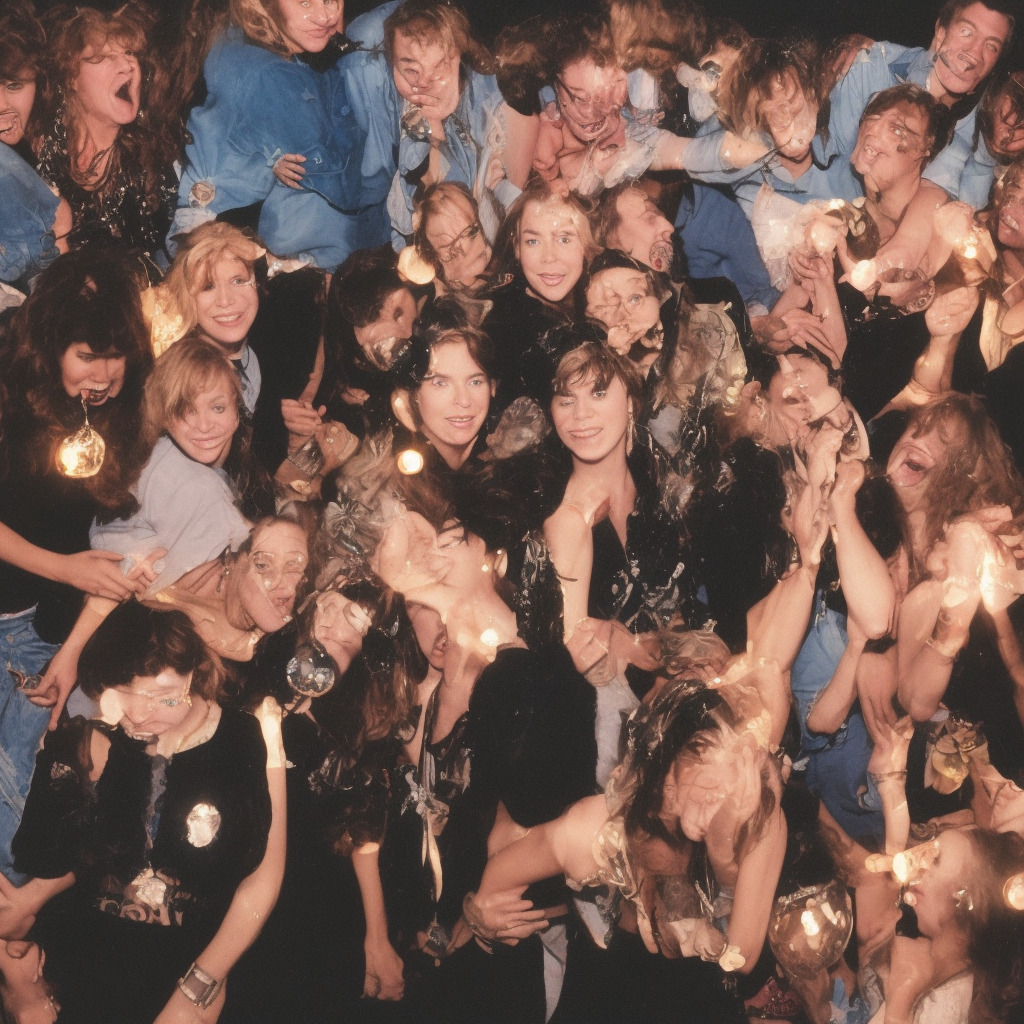🎶 Did you know “Don’t You (Forget About Me)” almost slipped past Simple Minds? Yup, they initially declined but later agreed! The result: an ’80s anthem that still resonates today! 🕺💃 #SimpleMinds #80sMusicTrivia #BreakfastClubSoundtrack Read about it: tinyurl.com/4cndcxft
Exploring the Timeless Impact of Simple Minds’ Iconic Hit
Diving into Simple Minds’ enduring legacy, from their iconic anthem “Don’t You (Forget About Me)” to a prolific career that shaped the sound of the 80s and beyond.

When one thinks about the 80s’ music scene, it’s impossible not to mention the Scottish rock band Simple Minds and their unforgettable anthem “Don’t You (Forget About Me).” Formed in 1977, Simple Minds proved themselves as a force to be reckoned with in the new wave and post-punk movements. Their influence and impact on the music scene have rightfully earned them a place in the history of rock music.
The band, originally consisting of members Jim Kerr (vocals), Charlie Burchill (guitar), Derek Forbes (bass), and Brian McGee (drums), went through several lineup changes over the years. However, Kerr and Burchill have always been the constant factors driving the band’s success. Despite having a few hits under their belt, it was their 1985 release, “Don’t You (Forget About Me),” that catapulted them into international stardom.
A song synonymous with the coming-of-age classic movie, “The Breakfast Club,” “Don’t You (Forget About Me)” perfectly captured the zeitgeist of its time. Although the band initially hesitated to record the song due to it being written by Keith Forsey and Steve Schiff, and not being their original work, they eventually agreed. Little did they know that the track would go on to define their entire career.
Now, it’s worth mentioning that Simple Minds’ catalog is far from being limited to just this one song. With a career spanning over four decades, the band has released multiple critically acclaimed albums, such as “New Gold Dream (81-82-83-84)” and “Sparkle in the Rain.” They’ve been known for their atmospheric soundscapes, electronic experimentation, and thought-provoking lyrics.
As for awards and accolades, Simple Minds received a Q Inspiration Award in 2001 and an Ivor Novello Award for Outstanding Song Collection in 2016. Moreover, they were inducted into the Scottish Music Hall of Fame in 2008 and were nominated for a BRIT Award in 1986 for Best British Group. While some critics argue that the band’s later work hasn’t quite lived up to their earlier strides, their massive contribution to the music industry and influence on many other artists cannot be denied.
In conclusion, “Don’t You (Forget About Me)” may be the most well-known song by Simple Minds, but it’s essential to remember the extensive and impressive body of work that the band has created over the years. Their ability to adapt, experiment, and remain relevant has solidified their position as one of the most iconic bands of the 80s and beyond.
Chart-Topping Success and Notable Achievements
“Don’t You (Forget About Me)” – Simple Minds’ unforgettable ’80s anthem that topped charts worldwide and cemented its place in music history.

“Don’t You (Forget About Me)” made its presence felt in the music charts worldwide since its release on 20th February 1985. The track was an immediate hit, soaring to the top of the charts and making a lasting impact on the music scene.
In the United States, “Don’t You (Forget About Me)” initially entered the Billboard Hot 100 chart at No. 70 on March 30th, 1985. The track gradually climbed the ranks, eventually reaching its peak position of No. 1 on May 18th, 1985. The song remained in the top spot for a week, and it stayed on the Hot 100 chart for a total of 22 weeks. Its No. 1 position on the Billboard Hot 100 marked Simple Minds’ first and only chart-topping hit in the US.
Meanwhile, the track achieved chart success in their home country, the United Kingdom, peaking at No. 7 on the UK Singles Chart. It was also their first single to enter the top 10 in the UK. This success marked a significant achievement for Simple Minds, as their previous single, “Up On The Catwalk,” had only managed to reach No. 27 in the UK charts.
In addition to the US and UK, “Don’t You (Forget About Me)” also fared well in other countries. The song reached No. 1 in Canada and the Netherlands, No. 2 in Ireland, and No. 6 in New Zealand. It also made it to the top 20 in several European countries such as France, Germany, and Switzerland.
The song’s popularity was further cemented when it received a BMI Award for being one of the most played songs on American radio and television in 1985. Moreover, it has since been ranked as one of the top 100 songs of the 1980s by various music publications and TV channels, like VH1 and Rolling Stone.
Overall, “Don’t You (Forget About Me)” can be considered a monumental success for Simple Minds, showcasing their ability to craft a catchy and memorable tune that resonated with audiences worldwide. With its chart achievements and enduring popularity, the song remains an iconic piece of music history to this day.
Peeling Back the Layers of “Don’t You (Forget About Me)”
Oh
Won’t you come see about me?
I’ll be alone, dancing, you know it, baby
Tell me your troubles and doubts
Giving me everything inside and out and
Love’s strange, so real in the dark
Think of the tender things that we were working on
Slow change may pull us apart
When the light gets into your heart, baby
Don’t you, forget about me
Don’t, don’t, don’t, don’t
Don’t you, forget about me
Will you stand above me?
Look my way, never love me
Rain keeps falling, rain keeps falling
Down, down, down
Will you recognize me?
Call my name or walk on by
Rain keeps falling, rain keeps falling
Down, down, down, down
Hey, hey, hey, hey
Oh
Don’t you try and pretend
It’s my feeling we’ll win in the end
I won’t harm you or touch your defenses
Vanity and security
Don’t you forget about me
I’ll be alone, dancing, you know it, baby
Going to take you apart
I’ll put us back together at heart, baby
Don’t you, forget about me
Don’t, don’t, don’t, don’t
Don’t you, forget about me
As you walk on by
Will you call my name?
As you walk on by
Will you call my name?
When you walk away
Or will you walk away?
Will you walk on by?
Come on, call my name
Will you call my name?
I say (la la la la la la la la la la)
When you walk on by
And you call my name…
The lyrics of “Don’t You (Forget About Me)” by Simple Minds possess a depth that transcends the initial appeal of the song. They resonate with the spirit of the mid-1980s, a time characterized by both emotional vulnerability and the desire for connection. The lyrics showcase a plea for remembrance and understanding, exploring themes of love, change, and the impermanence of relationships.
The lines “Tell me your troubles and doubts / Giving me everything inside and out” and “Slow change may pull us apart / When the light gets into your heart, baby” depict the complexities of love and human connection. The lyrics capture the essence of the era, as the 1980s saw a shift in societal attitudes towards relationships and self-expression. The song serves as a reflection of the uncertainty that comes with change, both in personal relationships and the world at large.
Additionally, the lyrics highlight a longing for connection and recognition, as seen in the lines “Will you recognize me? / Call my name or walk on by”. This theme resonates with the changing landscape of the 1980s, a time when communication technology advanced rapidly, and people began to explore new ways of connecting with one another. The lyrics serve as a reminder of the importance of maintaining genuine connections in a rapidly evolving world.
In conclusion, the lyrics of “Don’t You (Forget About Me)” by Simple Minds provide a captivating exploration of love, change, and the desire for connection. They serve as a beautiful reflection of the spirit of the time and the events of the era in which the song was written.
Delving Into the Visual World of “Don’t You (Forget About Me)”
Experience the timeless depth of Simple Minds’ “Don’t You (Forget About Me)” music video – a monochromatic masterpiece of emotion, artistry, and rain-soaked drama.
The music video for Simple Minds’ iconic track, “Don’t You (Forget About Me),” directed by Daniel Kleinman, is undoubtedly a significant part of the song’s history. Kleinman, known for his work on several James Bond films and music videos for artists such as Madonna and Fleetwood Mac, brought a unique touch to the visual aspect of this 80s anthem.
The video was shot entirely in black and white, giving it a timeless feel that still resonates with viewers today. The decision to shoot in black and white also served to emphasize the song’s emotional depth and urgency while providing a stark contrast to the vibrant and colorful videos that were popular during that time.
Filmed in a warehouse, the music video showcases lead singer Jim Kerr passionately belting out the lyrics as the band performs in the background. As the camera moves in and out of focus, we see various close-up shots of Kerr and the band members, creating an intimate atmosphere that draws the viewer in. This style is also a reflection of Kleinman’s artistic approach, often giving the impression that the viewer is part of the action.
One of the most memorable elements of the video is the use of rain throughout the shoot. The band members are seen performing in the rain, creating a dramatic effect and intensifying the emotional tone of the song. This visual choice also complements the song’s theme of longing and the fear of being forgotten. Additionally, the rain serves as a symbolic representation of the tears shed by those who have experienced heartbreak and the cleansing process that often accompanies moving on from the past.
Though the exact budget for the “Don’t You (Forget About Me)” music video is not publicly available, it is clear that Kleinman and the production team spared no expense in creating a visually stunning and emotionally evocative piece of art that continues to resonate with audiences today.
Fans of the song have contributed their own artistic interpretations through various fan-made videos and YouTube tributes. From compilations of memorable moments from the film “The Breakfast Club” (which famously features the song) to imaginative animations and even acoustic covers, the passion for this classic track remains strong in the digital age.
Overall, the music video for “Don’t You (Forget About Me)” serves as a perfect companion to Simple Minds’ powerful anthem. Through its artistic approach and timeless visuals, the video continues to make an impact on both new and old fans alike, solidifying its place in music video history.
The Mastermind Behind the Iconic Tune
The composer responsible for the unforgettable anthem “Don’t You (Forget About Me)” is none other than Keith Forsey, a talented musician, songwriter, and record producer. Born in London, Forsey was initially known for his work as a drummer with various bands before transitioning into producing and songwriting. Throughout his career, he has collaborated with some of the biggest names in the music industry, including Donna Summer and Billy Idol.
One of his most notable songwriting accomplishments is co-writing “Flashdance… What a Feeling,” the Academy Award-winning song for Best Original Song from the movie “Flashdance.” Forsey’s brilliant touch has led to numerous hits, solidifying his status as a music industry legend.
A Timeless Classic: Accolades, Appearances, and Covers
A Timeless Anthem: “Don’t You (Forget About Me)” prevails as an 80s classic with its powerful message, unforgettable hook, and cross-generational appeal, remaining a beloved treasure in the world of music and pop culture.

“Don’t You (Forget About Me)” has remained an iconic anthem in the world of music over the years. The song, released in 1985, was a massive hit for the Scottish rock band Simple Minds, written by Keith Forsey and Steve Schiff. The single spent three weeks on top of the Billboard Hot 100, catapulting the band’s fame in the United States.
The song has been honored and acclaimed for its powerful message and its enduring appeal. In 2013, VH1 placed “Don’t You (Forget About Me)” at number 22 on their list of the 100 Greatest Songs of the 80s. This track’s catchy hook and the unforgettable chorus continue to resonate with both older fans and newer generations, helping it withstand the test of time.
One of the reasons behind this track’s iconic status is its association with the classic 1985 John Hughes film, “The Breakfast Club.” The song is played during the movie’s opening and closing scenes, encapsulating the spirit of teenage rebellion and the bonding of unlikely friends. Over time, the song has also been featured in various TV shows, such as “South Park,” “Scrubs,” “Family Guy,” and “Brooklyn Nine-Nine,” reinforcing its timeless appeal.
In the realm of video games, “Don’t You (Forget About Me)” has made its mark as well. The song appeared in games like “Saints Row 2” and “Lego Rock Band,” allowing fans to experience the classic tune in a whole new interactive way.
Many artists have paid homage to Simple Minds by covering their most famous track. Some notable covers include a soulful rendition by Gloria Gaynor, punk rock versions by Billy Idol and Life of Agony, and an orchestral adaptation by David Cook. Additionally, “Don’t You (Forget About Me)” has been covered by renowned artists such as Victoria Justice, Bayside, and New Found Glory, further attesting to the song’s enduring influence across different music genres.
Despite numerous covers and adaptations, “Don’t You (Forget About Me)” remains a defining moment in Simple Minds’ career and continues to hold a special place in the hearts of music enthusiasts worldwide.
Exploring the Musicality
Diving into the musical aspects of “Don’t You (Forget About Me),” it’s evident that the song’s structure and arrangement play a significant role in its lasting success. Written in the key of D major, the song features a catchy and memorable chord progression consisting of D, G, A, and B minor. The song’s intro is built around a simple, repetitive synth riff that immediately hooks the listener and sets the stage for the rest of the track.
The song’s tempo is set at a moderate pace of 111 BPM (beats per minute), which complements the anthemic and uplifting mood of the track. The rhythm section, consisting of the bass and drums, maintains a steady groove throughout the song, providing a solid foundation for the melodic elements to shine. The bass line, in particular, is quite prominent and follows a syncopated pattern that adds a sense of depth and movement to the overall arrangement.
One of the defining features of “Don’t You (Forget About Me)” is the use of dynamic contrast. The song starts with a relatively sparse arrangement during the verses, featuring mainly the synth riff, bass, drums, and Jim Kerr’s distinctive vocals. As the song progresses towards the chorus, additional layers of guitars and keyboards are gradually introduced, culminating in an explosive and anthemic chorus that contrasts beautifully with the more subdued verses.
Another noteworthy aspect of the song is the use of reverb, which serves to create a sense of spaciousness and depth in the mix. The reverb is particularly noticeable on the snare drum, as well as in the vocals during the chorus, where it helps to emphasize the soaring melody and enhance the overall sense of grandeur and emotion.
Lastly, it’s impossible to discuss “Don’t You (Forget About Me)” without mentioning its iconic, wordless vocal hook. Consisting of a series of “la la la’s” sung in falsetto, this simple yet effective melodic motif recurs throughout the song, acting as a unifying element and providing an additional layer of memorability and catchiness.
In conclusion, the enduring appeal of “Don’t You (Forget About Me)” can be attributed not only to its relatable lyrics and powerful vocal performance but also to its carefully crafted musical structure and arrangement. The combination of these elements results in a timeless classic that continues to resonate with audiences more than three decades after its initial release.







